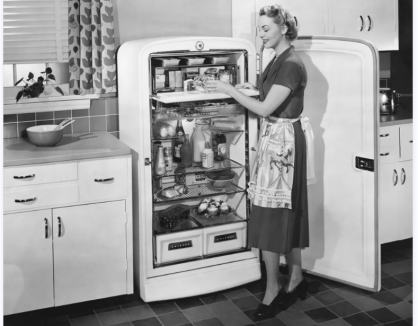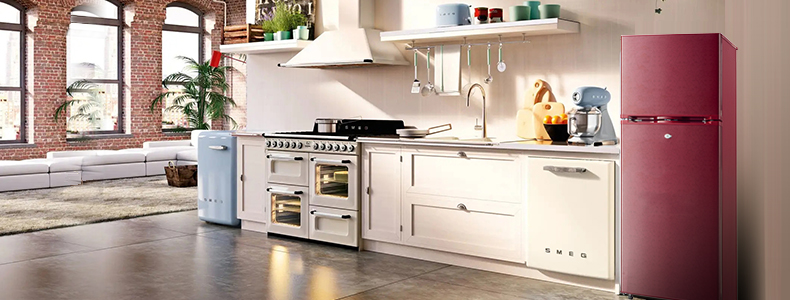
Refrigeration is the process of creating cooling conditions by removing heat. It is mostly used to preserve food and other perishable items, preventing foodborne illnesses. It works because bacteria growth is slowed at lower temperatures.
Methods for preserving food by cooling have been around for thousands of years, but the modern refrigerator is a recent invention. Today, the demand for refrigeration and air conditioning represent nearly 20 percent of energy consumption worldwide, according to a 2015 article in the International Journal of Refrigeration.
History
The Chinese cut and stored ice around 1000 B.C., and 500 years later, the Egyptians and Indians learned to leave earthenware pots out during cold nights to make ice, according to Keep It Cool, a heating and cooling company based in Lake Park, Florida. Other civilizations, such as the Greeks, Romans and Hebrews, stored snow in pits and covered them with various insulating materials, according to History magazine. In various places in Europe during the 17th century, saltpeter dissolved in water was found to create cooling conditions and was used to create ice. In the 18th century, Europeans collected ice in the winter, salted it, wrapped it in flannel, and stored it underground where it kept for months. Ice was even shipped to other locations around the world, according to a 2004 article published in the journal of the American Society of Heating, Refrigeration, and Air-Conditioning Engineers (ASHRAE).
Evaporative cooling

The concept of mechanical refrigeration began when William Cullen, a Scottish doctor, observed that evaporation had a cooling effect in the 1720s. He demonstrated his ideas in 1748 by evaporating ethyl ether in a vacuum, according to Peak Mechanical Partnership, a plumbing and heating company based in Saskatoon, Saskatchewan.
Oliver Evans, an American inventor, designed but did not build a refrigeration machine that used vapor instead of liquid in 1805. In 1820, English scientist Michael Faraday used liquefied ammonia to cause cooling. Jacob Perkins, who worked with Evans, received a patent for a vaporcompression cycle using liquid ammonia in 1835, according to History of Refrigeration. For that, he is sometimes called the "father of the refrigerator."John Gorrie, an America doctor, also built a machine similar to Evans' design in 1842. Gorrie used his refrigerator, which created ice, to cool down patients with yellow fever in a Florida hospital. Gorrie received the first U.S. patent for his method of artificially creating ice in 1851.
Other inventors around the world continued to develop newand improve existing techniques for refrigeration, according to Peak Mechanical, including:
Ferdinand Carré, a French engineer, developed a refrigerator that used a mixture containing ammonia and water in 1859.
Carl von Linde, a German scientist, invented a portable compressor refrigeration machine using methyl ether in 1873, and in 1876 switched to ammonia. In 1894, Linde also developed new methods for liquefying large amounts of air.
1899,Albert T. Marshall, an American inventor, patented the first mechanical refrigerator.
Renowned physicist Albert Einstein patented a refrigerator in 1930 with the idea of creating an environmentally friendly refrigerator with no moving parts and did not rely on electricity.
The popularity of commercial refrigeration grew toward the end of the 19th century due to breweries, according to Peak Mechanical, where the first refrigerator was installed at a brewery in Brooklyn, New York, in 1870. By the turn of the century, nearly all breweries had a refrigerator.
The meatpacking industry followed with the first refrigerator introduced in Chicago in 1900, according to History magazine, and almost 15 years later, nearly all meatpacking plants used refrigerators.Refrigerators were considered essential in homes by the 1920s, and more than 90 percent of American homes had a refrigerator.
Today, nearly all homes in the United States — 99 percent — have at least one refrigerator, and about 26 percent of U.S. homes have more than one, according to a 2009 report by the U.S. Department of Energy.
Post time: Jul-04-2022

